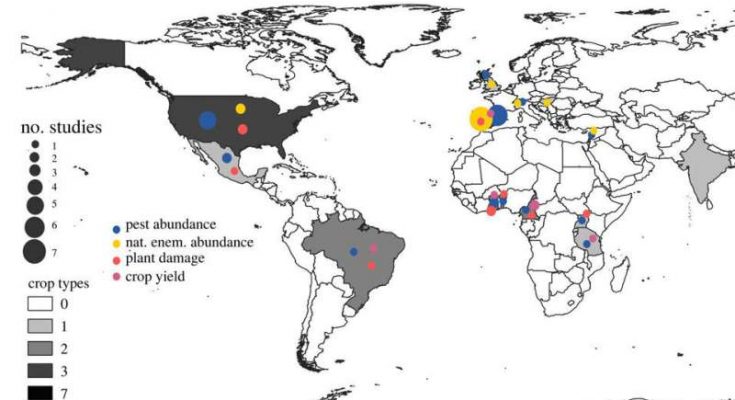A team of researchers affiliated with several institutions in Brazil, working with one colleague from Spain and another from the U.S., has found evidence that suggests ants can be used as a natural pesticide for a wide variety of crops.
In their paper published in Proceedings of the Royal Society B: Biological Sciences, the group describes how they analyzed studies conducted by researchers across the world to learn more about the possible use of natural pest control options by farmers and what they learned by doing so.
Over the past several decades, farmers around the world have turned to commercial pesticides to increase crop yields—reducing the number of insects that feed on crops results in more product. Unfortunately, prior research has shown that such pesticides can have some dramatic side effects, such as reductions in pollinators, pollution and concerns about what the chemicals in the pesticides do to the people that eat the crops. Because of that, researchers around the world have started looking into the possibility of using natural pesticides. One such natural approach has involved the use of ants—they leave the crops alone and instead feed on the insects that damage plants.
Use of ants to control pests has a long history, citrus growers in China, for example, have been using ants to control pests in fruit trees for centuries. In this new effort, the researchers wondered what other researchers have found when looking into the use of ants as a natural pesticide. To find out, they searched for published research papers on the topic and found 52 of them that had involved looking into the use of ants as a way to control pests, covering 17 different types of crops.
In analyzing the papers, the researchers found that most of the studies had led to discoveries of ants providing a high level of pest control—and in some cases, the ants were even better at it than commercial pesticides. They also found that the ants did their best work when used with crops grown in partial shade, and were the least effective when used with crops that produce honeydew—in such plants, ants tended to farm the insects, such as aphids, in order to provide themselves with the sweet liquid.
The researchers conclude by suggesting that the use of ants to control pests appears to be a sustainable and inexpensive way to control pests on both large and small farms.
#Pesticides; #Ants; #Agriculture





